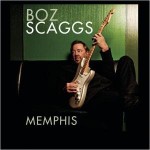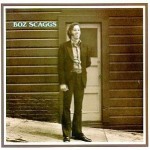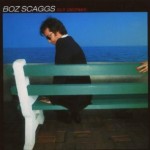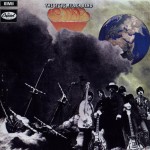Although Boz Scaggs is best known for the slick R&B hits “Lowdown” and “Lido Shuffle” from his breakthrough 1976 album Silk Degrees, his career in music has spanned much, much more.
Scaggs first made a mark as a member of the Steve Miller Band during their early psychedelic rock phase, playing guitar plus writing and singing a few songs on the band’s first two albums.
His first solo album after leaving Miller’s orbit was recorded at the legendary Muscle Shoals Sound Studio, and featured a young Duane Allman on guitar shortly before Allman reached guitar god status. This has been ranked in the Top 500 albums of all time by Rolling Stone Magazine.
Subsequent solo releases were also well regarded, hitting a peak with the aforementioned Silk Degrees which sold millions of copies and won Scaggs a Grammy for Best R&B Song for “Lowdown”. Scaggs has continued to release acclaimed albums over the years, most recently the covers-heavy Memphis.
This interview was for a preview article for Boz Scagg’s concert at the Chumash Casino on 9/12/13. It was done by phone on 8/28/13.
Jeff Moehlis: What can we look forward to at your upcoming show at the Chumash Casino?
Boz Scaggs: You can look forward to a really good band of top musicians, who are going to be helping me through some music that much of your audience perhaps has heard on the radio over the years. There’ll be some hits, there’ll be some blues, and some R&B things from my past. And, of course, I’m playing music from a new record called Memphis, which was released in the earlier part of this year. It’s all over the map, kind of.

JM: Speaking of your new album Memphis, how did you decide which songs to cover for that?
BS: I made demos for myself. I’d try out each song – I tried different arrangements, different keys, different approaches. When I find a song that I really like to sing, that I think I can do some justice to, it becomes a candidate. And then I bounced some ideas around with my producer Steve Jordan. Between the two of us we came up with a shortlist, and that’s how we’d choose our songs.
JM: I thought it was cool that you have some songs by Willy DeVille. Did you ever meet him?
BS: Yeah, I met Willy once. He played in San Francisco, and I went to see him and spent a little time with him after the show.
JM: If you don’t mind going back in time a little bit, what was the good, the bad, and the ugly about the San Francisco music scene back in the late Sixties?
BS: Well, the good was that so many musicians converged upon that scene, so many styles. I think it told us all how closely related we were. There was a great intermingling of all sorts of forms of music from all the bands and musicians that were coming in, folk music and rock and roll and blues and jazz. Everyone from Ravi Shankar to the British Blues and Pop Invasion with Led Zeppelin and Eric Clapton and Cream. Janis Joplin, Otis Redding, great blues artists, Miles Davis. You know, everybody came through that scene. It was a great cross-pollination. You know, Miles borrowed from the scene. It just crossed over.
It was a great explosion, probably the greatest thing that happened in the Twentieth Century in popular music. I can’t think of any other convergence that was so… ooof! So that’s the good of it.
The bad of it… I don’t know, I don’t dwell on… I don’t think there was any real bad that came of it. There was an aftermath to the Haight-Ashbury scene after everybody went home after the Summer of Love. I mean, I’m generalizing. After the great convergence there was a tapering off. Just like a high, you know, there’s a comedown always. There was something empty after the party, after the parade went through. But, not bad. It’s life. It’s kind of remarkable, the trail of ideas and the effect that it had on the culture.
JM: Unfortunately I missed the fun. I was born in 1970.
BS: Yeah, well you’ve probably absorbed more of it than you realize. It’s still around. It certainly influenced a generation and had its fallout. I have a son who’s thirty-five years old, and he knows an awful lot about the music from that time, and you probably do, too.

JM: Your first solo album after you left the Steve Miller band has the song “Loan Me a Dime”, with that killer guitar solo by Duane Allman. What was it like recording with him?
BS: Duane was a very big influence on those sessions. It took place at Muscle Shoals, and there were studio musicians. Duane had been an active musician with that section and left about six months before to start the Allman Brothers Band. So it was something of a reunion for him to come back to Muscle Shoals and work with those guys. He was very much respected, and I’d say loved by those guys. And his coming in, he inspired those sessions. And, you know, personally he was a wonderful guy. Besides being a fantastic musician he was a real solid guy. A very kind guy, a funny guy. A very private guy in his own way. And just a really wonderful presence.
JM: Is it true that he had to be put in a separate room because his playing was so loud?
BS: Well, you know, the studio doesn’t have a lot of booths or spaces, so you have to separate things that bleed into other microphones. The drums are going to leak into the horns, and the guitar is going to leak into the bass. You’ve got to separate them to some degree. You want some bleed into each other, but you have to separate the snare drum from the vocal microphone, and stuff like that.
In order to get his tone he used a very small amplifier, and he turned it up in order to get distortion out of the speaker. So you always isolate that amplifier, that’s just the way you do it. The only place that they had to isolate Duane’s guitar was in this little bathroom. I was doing the vocal live out in a little room where they had a coin machine, a coke machine. So I was locked up in there with my microphone. The horns were over on one side of the room, and the bass and drums… you had to get that isolation. That’s where Duane was, perched up on top of the john.

JM: Moving on to your album Silk Degrees, which was a huge, smash hit. What are your reflections on that album?
BS: It was really a great experience for me to work with those musicians. They were young, very highly respected studio musicians. My sessions, I think, were somewhat special for them because I really used their talent and ability as arrangers. I wanted their opinion. I really locked in with them. And we had a lot of fun making that record. They got to do things with my sessions that they might not have gotten to do with some of the other sessions they were doing. It was a special occasion, and a lot of fun for all of us. We made good music, and of course we got to enjoy the success of that album. Just wonderful. I’ve remained friends with everybody I worked with.
JM: You probably always get asked this. Is Lido from “Lido Shuffle” based on a real person?
BS: No, it’s just fictional. Just an idea.
JM: What advice would you give to an aspiring musician?
BS: Play live, as much as possible. That’s how it happens. That’s what happened to Bob Dylan, that’s what happened to The Beatles, that’s what happened to The Rolling Stones. That’s what happens to the best jazz musicians. The musicians who love music play music. Take any opportunity to play live. Play for free, do whatever you’ve got to do. But play for people.
JM: Do you want to set the record straight on anything about your career?
BS: The only thing… It was listed on my first record that I wrote “Loan Me a Dime”, but I didn’t. It was a mistake the record company made. I always felt bad that the writer [Fenton Robinson] wasn’t credited at that time. He was mad at me, thought that I was trying to steal his song. But I wasn’t.
JM: That became a legal issue. Were you satisfied with how that was resolved?
BS: Yeah. I never made any claims to have written the song. All royalties and everything were transferred once we found out who the writer was, it all went to him. I’m just sorry for the mistake.

JM: Last night I was listening to the album Sailor by the Steve Miller Band. That’s really one of the great psychedelic rock records. Do you have any memories of that album that you’d like to share?
BS: It was fun. It was a more experimental time. There were all sorts of recording tricks and audio things to play around with. We worked with a producer who was from London who had worked with some of the great acts and had been involved in some of the important recordings of our time. To be working in Los Angeles with Glyn Johns was pretty exciting. Everyday was a long day. It was just an exciting time. The L.A. studio scene was a lot of fun, a lot of musicians around, a lot of energy. We were just getting our footing. I was kind of helping out in Steve Miller’s band at that time. We were all just finding out what we could do. I was writing my first songs, and getting to experiment with different ways of approaching them. It was exciting going to the studio every day.
JM: Last question – where are you speaking to me from?
BS: I’m up in the hills near Napa.


Discussion
No comments for “Interview: Boz Scaggs”